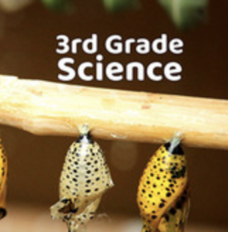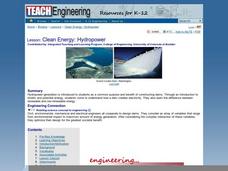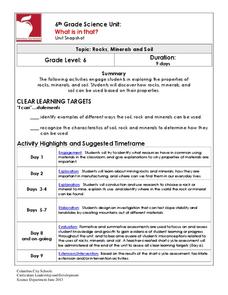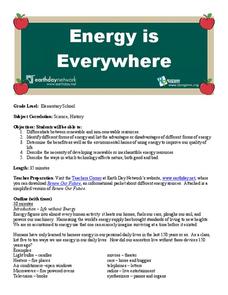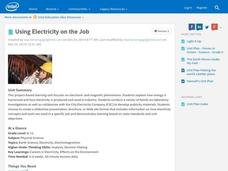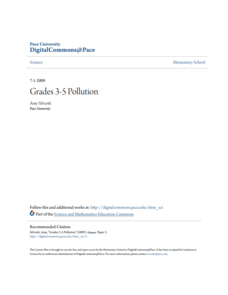College Board
2004 AP® Calculus BC Free-Response Questions
Given a set of questions, pupils realize the way the Calculus BC free-response exam asks questions. The items include both contextual and non-contextual questions. Both types are split into the calculator and non-calculator sections for...
Utah Education Network (UEN)
Utah Open Textbook: 3rd Grade Science
How do we interact with Earth? Scholars learn about the sun, Earth, moon, forces, gravity, and heat sources by reading a text and performing hands-on demonstrations. They also differentiate between living and non-living things using...
College Board
2005 AP® Calculus AB Free-Response Questions
Develop an awareness of the exam. Pupils and teachers use the six release free-response questions to see how the exam covers topics. The questions are divided among calculator and non-calculator items. Scholars see the importance of...
Curated OER
Ionic and Covalent Bonding - Smart Board Notes
On this note-taking sheeet, chemistry learners list elements as metals or non-metals. They differentiate between ionic and covalent bonds. They draw Lewis structures for both types of bonds. This would be a terrific teaching tool when...
Curated OER
Clean Energy: Hydro-power
Students read about and discuss renewable and non renewable energy and identify how a dam produced energy using hydro-power. In this water energy lesson plan, students look at diagrams and pictures of water energy technology.
Curated OER
Worksheet 1
In this math worksheet, students describe the difference between a partial and an ordinary differential equation. They give examples of 1st, 2nd, and 3rd order differential equations. Students apply this information to predator/prey...
Curated OER
Background of Diseases-- Germs or Genes?
Students explore the background of common diseases. In this personal health instructional activity, students research causative agents of communicable and non-communicable diseases. Students use their research findings to create data...
EngageNY
Using Trigonometry to Find Side Lengths of an Acute Triangle
Not all triangles are right! Pupils learn to tackle non-right triangles using the Law of Sines and Law of Cosines. After using the two laws, they then apply them to word problems.
Virginia Department of Education
Lines and Angles
Explore angle relationships associated with transversals. Pupils construct parallel lines with a transversal and find the measures of the angles formed. They figure out how the different angles are related before constructing...
Curated OER
Worksheet 4
In this math worksheet, students write down five exact differential equations in symmetric form. Then they test the statements concerning differential equations.
US Department of Energy
Thermodynamics—Teacher Guide
I'm so cool! No, you're exothermic. This thermodynamics lab unit includes an introduction, teacher demonstrations, six labs that students rotate through each class day, homework assignments, application of knowledge, and assessments....
Columbus City Schools
What is in that?
Invite your class to dig in to an engaging journey into the world of mining! Here you'll find the tools to equip young miners with knowledge of soil, rocks, and minerals, as well as types of mining operations. To round things out, the...
Center for Civic Education
The Power of Nonviolence: Rosa Parks: A Quest for Equal Protection Under the Law
Teach young historians about the historical legacy of Rosa Parks with a multi-faceted lesson plan. Pupils follow stations and use journals to explore prominent events, analyze primary resource documents, and engage in interesting...
Council for Economic Education
Satisfaction Please! (Part 2)
Simply understanding consumer rights may not help people solve their problems. Understanding who to turn to becomes key in many different scenarios. Teach the value of various organizations that fight for consumer rights through...
Curated OER
Non-Point Source Pollution
Students study non-point source pollution. They research the concept of bio-degradation and/or Nutrients/Fertilizers and discuss how non-point source pollution impacts the environment. Afterwards, they participate in an interactive...
Curated OER
Energy is Everywhere
Students differentiate between renewable and non-renewable resources and identify the different forms of energy and list the advantages or disadvantages of different forms of energy. They also determine the benefits as well as the...
Curated OER
Lions and Tigers and Bears - Oh My!
Research animals and develop a non-fiction presentation. Young scholars will complete research on a particular animal and determine the animal's characteristics as well as habitat before choosing a differentiated project to present using...
Curated OER
Wolf Fact Cards
Students write a non-chronological report about wolves. They read and discuss wolf fact cards in small groups, complete a KWL chart, observe the teacher model the steps of writing a report, and conduct research and write an original...
Curated OER
Presenting Constitutional Issues in a Non-adversarial Mode
Students study the Fourth, Fifth, Sixth, Eighth Amendments to the US Constitution. They apply different points of view to their research and present their finding to the class.
College Board
Civic Knowledge and Action: Voter Registration
What does the data say? Using provided voter data from the 2016 presidential election, scholars describe the data and identify questions they could answer by analyzing it. Learners then construct tables and use them to determine whether...
Pennsylvania Department of Education
Exploring Key Ideas and Details in Fiction and Nonfiction
Third graders participate in activities to differentiate fiction from nonfiction. In this fiction lesson plan, 3rd graders describe the elements of a fiction story. Students compare and contrast fiction and non fiction elements....
Intel
Using Electricity on the Job
Learners explore electricity, discussing its importance and researching different ways in which electricity can be generated. Groups present their findings to the class and then create publicity materials which promote and educate about...
Pace University
Pollution
Over the course of 10 days, scholars take a pre-assessment to place them in one of three leveled groups. Whole-class and in small groups, pupils take part in read-alouds, field trips, hands-on activities, and complete learning contracts...
Maryland Department of Education
The Concept of Diversity in World Literature Lesson 9: Debating Imperialism
To gain an understanding of Imperialism, class members read Rudyard Kipling's poem, "The White Man's Burden" and Mark Twain's essay, "To the Person Sitting in Darkness." Groups compare these perceptions of non-white cultures with the...



